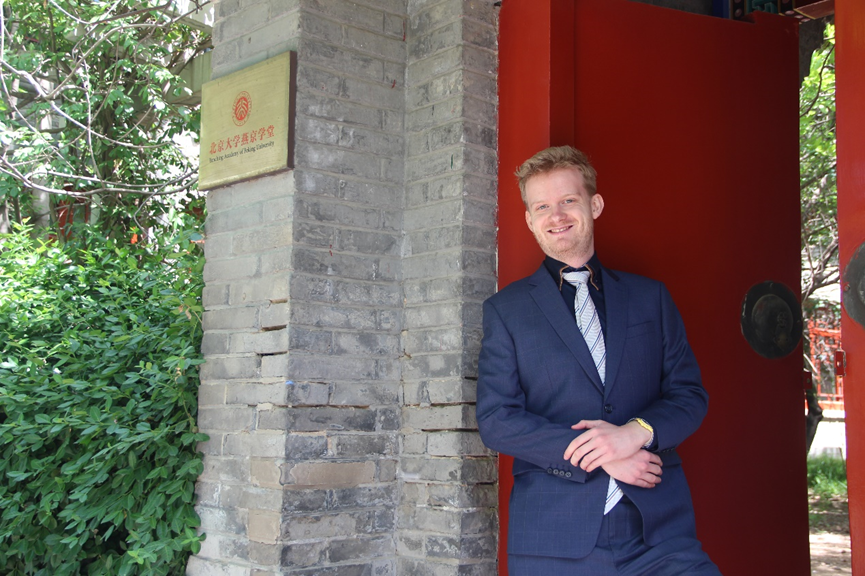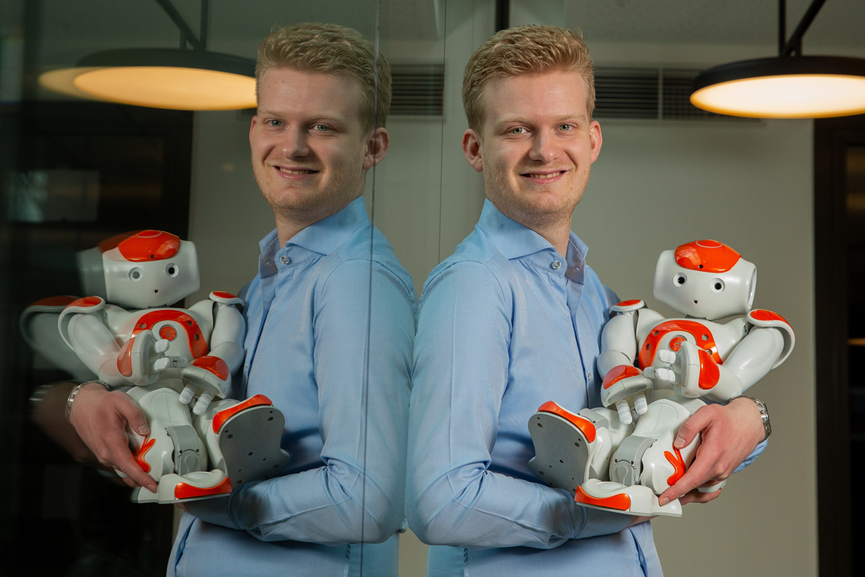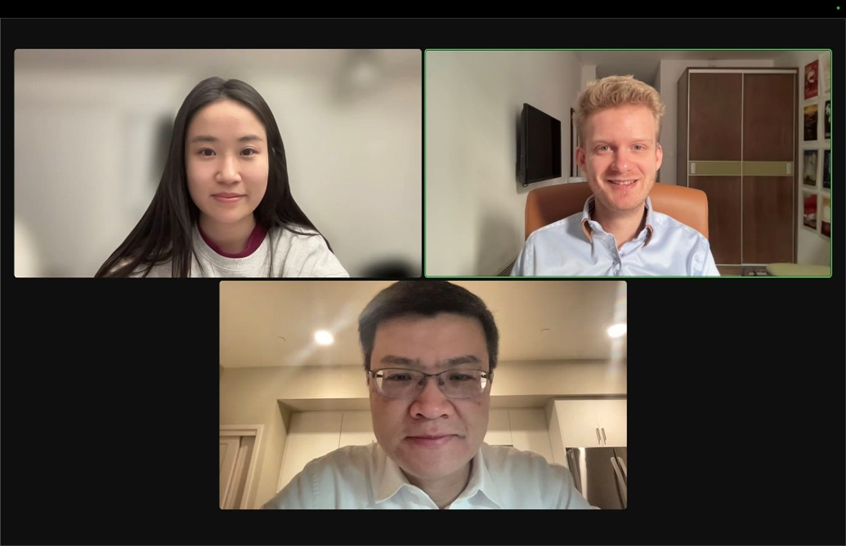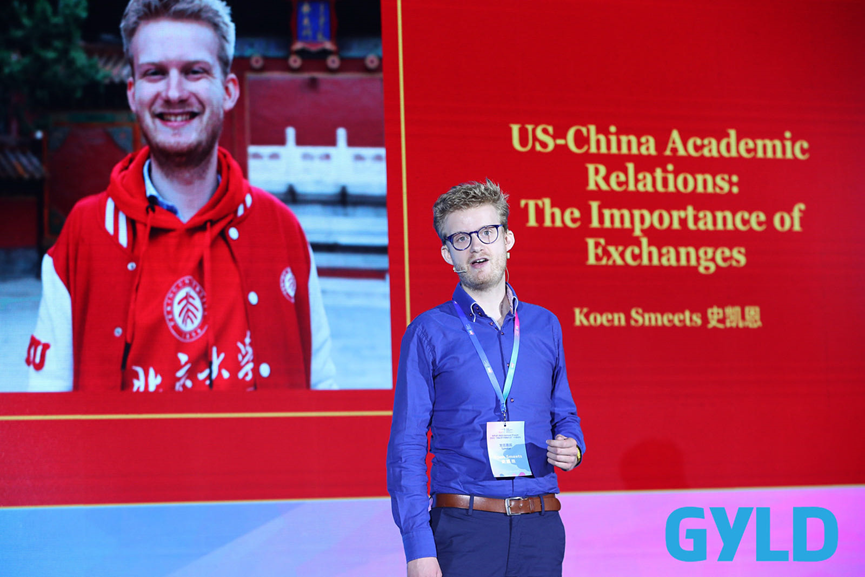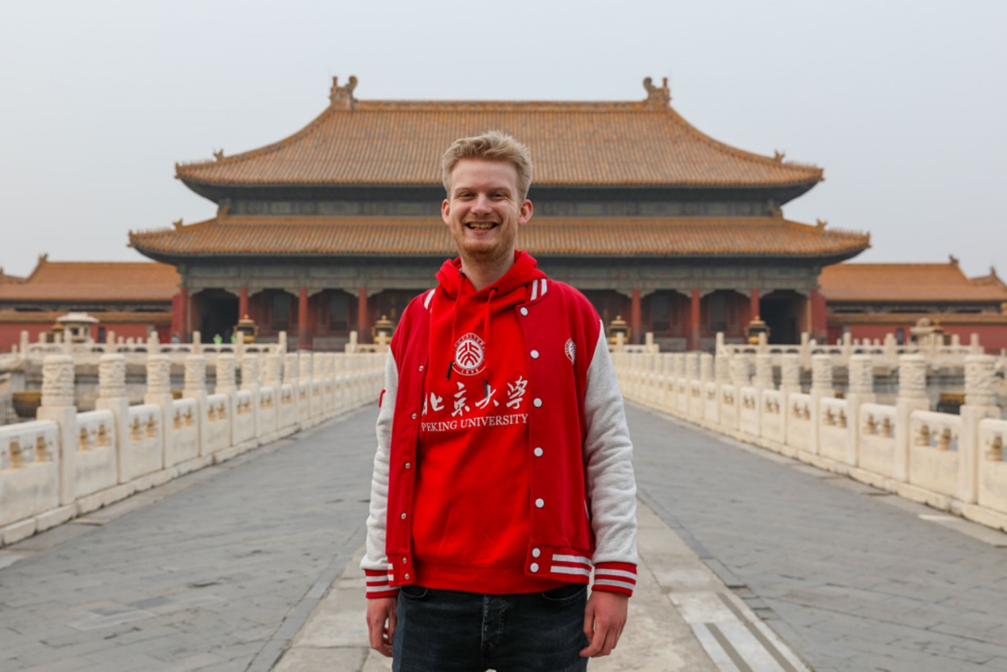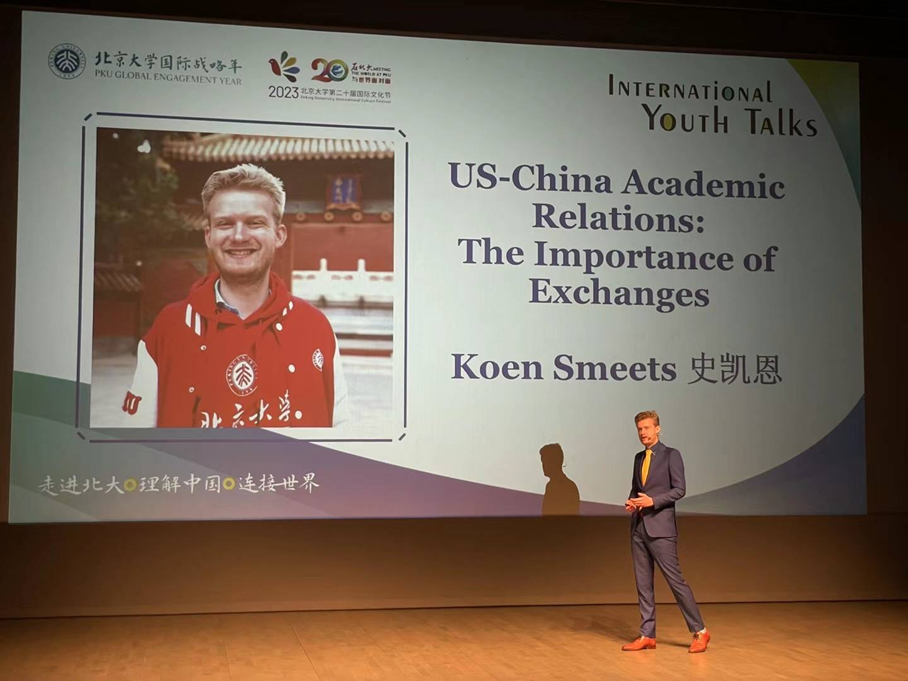Koen Smeets at Yenching Academy.
Editor's note: May 5, 2024, marked the tenth anniversary of the founding of the Yenching Academy at Peking University (PKU). Since its inception, Yenching Academy has striven to cultivate new generations of global citizens with a nuanced understanding of China. In a recent interview, Sean Elijah Tan, a Yenching Scholar '23 from Malaysia, spoke with Koen Smeets, a Yenching Scholar '22 from the Netherlands, on the latter's inspirational research on Sino-US academic relations.
Peking University, May 8, 2024: A high school student stumbles upon a dusty book titled World History: China in a library clearance sale. Little did he know that chance encounter would set him on a path of discovery spanning continents and cultures.
That high school student was Koen Smeets, whose curiosity propelled him from the corners of a library in the Netherlands to the vibrant Jingyuan Courtyard at the Yenching Academy of Peking University in Beijing, China.
His focus? The past, present, and future of academic relations between the United States and China. With a desire to unravel the intricate academic discourse between two global powerhouses and preserve its oral history, Smeets stands out as one of the few scholar-practitioners in this specialized field.
Preserving the History of Sino-American Academic Discourse
Currently armed with over 70 interviews conducted with experts spanning various topics—from Sino-American relations to the societal implications of disruptive technologies and political economy—his journey serves as a testament to the transformative power of cross-cultural dialogue.
For Smeets, it all began in a pivotal class at the PKU Stanford Center. Originally focused on a paper about education in China, his trajectory took an unexpected turn as he delved into interviews with the first Americans in China since the normalization of relations in 1979, revealing a glaring absence of historical records from this crucial period.
"No one had any insights into the lives of the initial cohort of American exchange students in China during that era or the establishment of academic relations at the time," he said, during a recent interview.
"I decided to make this a long-term project," he added.
Smeets interviews Prof. Da Wei, director of the Center of International Strategy and Security at Tsinghua University, with his friend Ziyi Guo, MA Student at Johns Hopkins SAIS.
In a bid to bridge a critical research gap, Smeets spearheads a pioneering initiative at PKU. Leading a team of over 20 dedicated students, he embarks on a mission to preserve the oral history surrounding the academic relations between China and the United States.
Their endeavour takes them deep into the annals of history, as they interview key negotiators involved in the normalization process and individuals who witnessed China's reemergence onto the global stage. Specifically, these investigations have led them to engage with the leadership of think tanks, Sino-American joint venture universities, and policymakers.
Through these conversations, Smeets and his team seek to unravel the intricacies of a pivotal period, shedding light on the dynamics that shaped the educational exchanges between these two nations.
In the next two years, these findings will culminate in a book detailing the experiences and impact of the first American exchange students in China. This comprehensive work will highlight their critical contributions to China’s technological ecosystem, ranging from negotiating joint ventures and fostering business development to facilitating technology transfers.
Smeets’s publication will offer a detailed overview of the re-establishment and contemporary state of U.S.-China academic relations, drawing invaluable lessons from history to inform and bolster present-day collaborations.
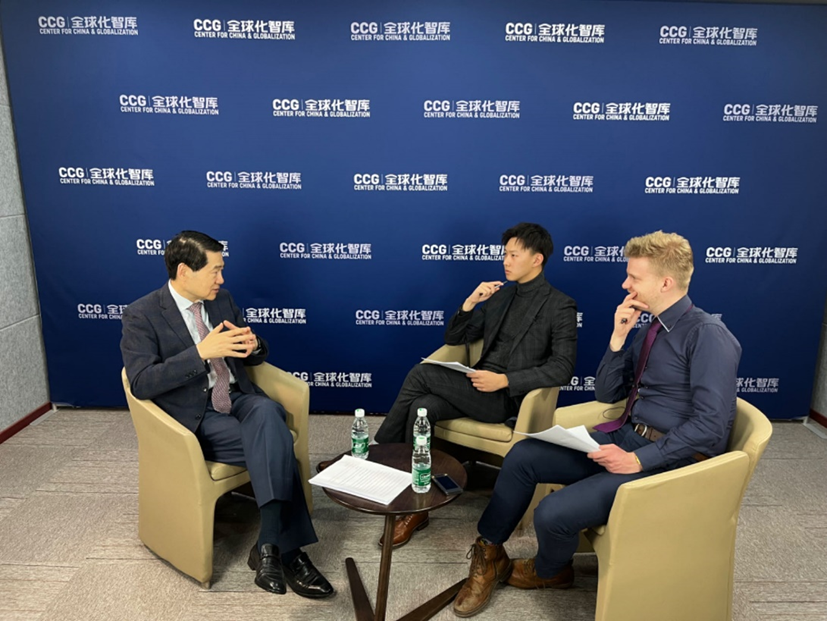
Smeets interviews Henry Huiyao Wang, founder and president of the Center for China and Globalization, with his friend Yipei Lu, a graduate student at Tsinghua University.
From Past to Present: Igniting Future Dialogues with Research
Through his research, Smeets hopes to assume the role of a neutral intermediary, fostering dialogue and advocating for increased collaboration in Sino-US academic exchange.
He observes that this arena stands as a rare common ground, where both sides converge on the necessity of further engagement.
To him, the present moment presents an opportune time for implementation, spurred by the expressed interest of leaders from both sides during the sidelines of the APEC Summit in November 2023. Notably, Chinese President Xi Jinping extended an invitation for 50,000 young Americans to participate in exchange and study programs in China over the next five years.
However, with only an estimated 800 Americans currently studying in China, there exists a gap to bridge.
Smeets remains hopeful that his research and efforts will play a pivotal role in realizing this ambitious tenfold increase within the next five years.
“It is crucial for the future leaders of both countries to have interactions with each other. With the current landscape characterized by strategic competition, maintaining this dialogue is vital for all parties involved,” he said.
Smeets presents his research at the Global Young Leaders Dialogue (GYLD) at the Center for China and Globalisation.
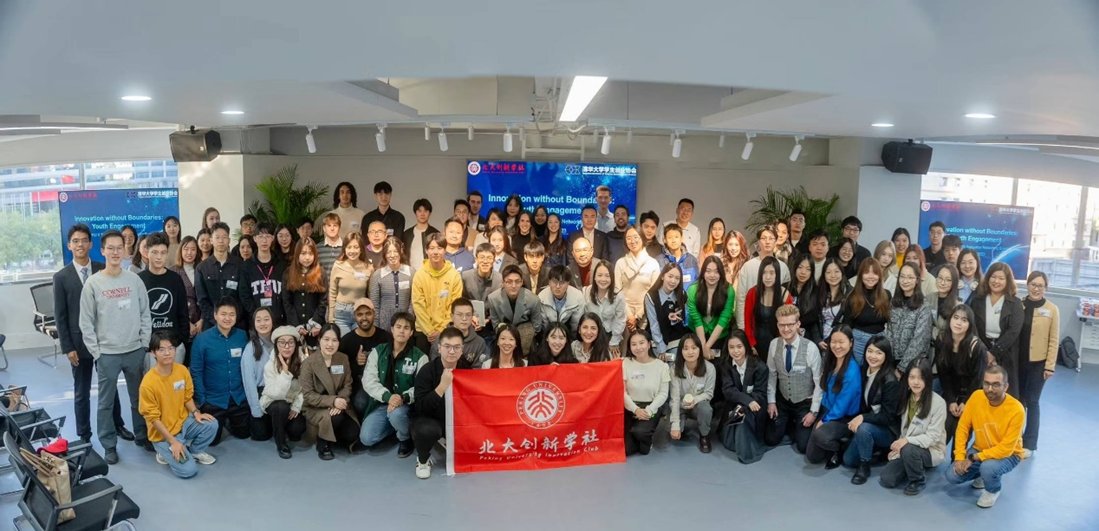
The PKUxTHU Networking Event as Head of International Students of PKU Student Innovation Club
Reflecting on his transformative journey, Smeets underscored the power of immersion—of wandering the streets, breaking bread, and forming deep connections with the people of China. He believes that it is through these intimate experiences that one can unlock profound insights into the culture and society of a nation.
Against this backdrop, Smeets perceives that the crux of the matter lies in the execution phase. While the vision for increased people-to-people exchanges between China and the US is clear, translating this vision into actionable initiatives presents its own set of challenges.
Navigating the complexities of international educational exchanges requires a concerted effort and innovative solutions, highlights Smeets, who remains undeterred, however, viewing these challenges as opportunities to foster creative partnerships and develop sustainable frameworks that will pave the way for a new era of collaborative learning and cross-cultural understanding.
Smeets during his first visit to the Forbidden City in Beijing.
PKU’s Legacy, Smeets’s Hope
Reflecting on his journey as a student at PKU, Smeets expressed gratitude for the role the university has played in his academic and personal growth.
He highlighted how the university served as a platform, with opportunities to speak at numerous conferences, collaborate with international experts, and, most importantly, engage deeply with the Chinese community, whom he regards as his most invaluable mentors.
"If it weren't for PKU Yenching Academy, I wouldn't have had the opportunity to experience China firsthand," he said. “To quote one of my American mentors who was one of the first graduate students in China, ‘The Chinese people are my teachers.’”
When asked about the advice he would give to aspiring scholars interested in the academic relations between China and the US, he urges individuals from both countries to step up efforts, weaving together diverse viewpoints in the pursuit of mutual understanding.
With unwavering enthusiasm, Smeets encourages fellow scholars to embark on their own journeys of discovery, embracing the richness of diverse cultures with open hearts and minds. For in these shared experiences lies the potential to build bridges, foster empathy, and pave the way for a future defined not by divisions, but by the bonds of human connection.
Smeets presents his research at the PKU International Youth Talks in celebration of the University’s 125th anniversary.
Interviewed and written by: Sean Elijah Tan
Edited by: Wang Jia En
Photos by: Courtesy of the interviewee
